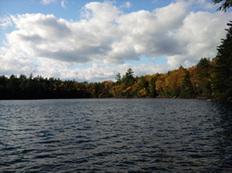Improving Water Quality Begins with Lakefront Property Owners

Out and About for the Sebago Lakes Region of Maine Aug. 1-7
July 31, 2013
Hikes In and Around Waldoboro, Maine
August 4, 2013Improving Water Quality Begins with Lakefront Property Owners

Cumulus Clouds over Echo Lake in Fayette, Maine
In Maine, lakefront property owners are drawn to the peace one can experience beside the water. For many years, Maine’s lakes and ponds have served as a summer destination where one can enjoy the clean waters and surrounding mountain vistas. This may mean falling asleep to water lapping the shore, dangling feet from the dock on a hot summer day or the more active sports like fishing and power boating.
Summer homes were originally built as simple camps or cottages with limited amenities; the main attraction was the lake. Those who lived on the lake were its stewards. Today, as those cottages and camps are sold, parts of the lakefront are undergoing re-development. The larger buildings that take their place increase impervious surface.
As more and more people buy, build or rebuild lakefront homes, they threaten the very qualities that brought them here.
The use and care of the land surrounding and draining to a lake largely determines the quality of its water. A change in water clarity impacts property values. Though it’s a lot for a lakefront property owner to consider the land uses in the entire watershed–all the land that surrounds a lake and drains or sheds its water into the lake–you can think about the property you own or are about to purchase and the changes you might make to help enhance the water quality.
Leaving the vegetated buffer in place or creating a vegetated buffer is an easy solution to ending storm water runoff. Though it is often unseen, water quality is most affected by this runoff. Storm water is concentrated runoff that enters our waterways directly through storm drains or over the surface, also referred to as non-point source pollution. With the flow of water comes more nutrient concentrations that feed algae and increased pollution from metals, pathogens and pesticides.
Nutrients such as phosphorus and nitrogen naturally occur in the hydrologic cycle and contribute to the aging process of water bodies. As I mentioned above, an increase of phosphorus from runoff increases algae growth. As this growth decays, dissolved oxygen levels in the lake are reduced. All aerobic organisms, such as fish, require oxygen for respiration, growth, reproduction and survival. When the dissolved oxygen content decreases, many fish and aquatic insects die. One easy way to avoid adding more phosphorus to the lake is to stop using phosphorus-laden lawn products.
Maintaining and improving camp roads will also help protect the quality of the water. Poorly maintained camp roads contribute to soil erosion, thus leading to water pollution. The Maine Department of Environmental Protection Bureau of Land and Water Quality publishes a guide about Camp Road Maintenance for lakefront landowners.
Another fix is proper maintenance of a septic system. According to John M. Jemison, Jr., water quality and soil specialist with the University of Maine, a septic system should be pumped periodically–meaning every 2-5 years.
As lakefront property owners, you have the privilege and responsibility to preserve and develop your land in harmony with the natural environment. In the end, you and your community will benefit from improved water quality.
To learn more about lakefront properties for sale on Echo Lake in the Belgrade Lakes Region of Maine, click on the green box above.
To learn more about planting a vegetated buffer zone and other ways to enhance water quality, check out the blog links below.
Maine Lakefront Owners Need to Know About Buffer Zone Management
Law Prevents Soil Erosion from Degrading Water Quality for Maine Lakefront Properties
Rain Gardens Save Water Quality for Maine Lakefront Real Estate
Preventing Our Maine Lakes From Becoming Polluted
